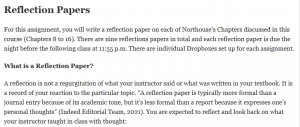Reflection Papers

For this assignment, you will write a reflection paper on each of Northouse’s Chapters discussed in this course (Chapters 8 to 16). There are nine reflections papers in total and each reflection paper is due the night before the following class at 11:55 p.m. There are individual Dropboxes set up for each assignment.
What is a Reflection Paper?
A reflection is not a regurgitation of what your instructor said or what was written in your textbook. It is a record of your reaction to the particular topic. “A reflection paper is typically more formal than a journal entry because of its academic tone, but it’s less formal than a report because it expresses one’s personal thoughts” (Indeed Editorial Team, 2021). You are expected to reflect and look back on what your instructor taught in class with thought:
· What did you learn?
· What are the essential points to you in this chapter?
· Did it trigger a past event that you can relate to?
· How will you apply this to your leadership practice (life at home, life at work, life in your community)?
· Where do you think the strengths and weaknesses are?
· How does that relate to the culture you came from? How will you apply it to your culture?
· Think of other cultures that are different from yours?
Please do not just answer the questions. You are expected to add your reflection, thoughts, and opinions on the subject.
Assignment Guidelines
· Minimum 1 page, double-spaced.
· Must be APA7.
· Make sure to use correct APA in-text citations for paraphrased ideas and quoted text.
Due date
· Each reflection paper is due the evening before the following class at 11:55 p.m. Please upload to the appropriate Dropbox under Assignment] [Dropbox] in Moodle.
How to Write a Reflective Paper
To start with the definition of a reflective paper, it is an essay in which you show your experience and impressions about how some events, books, people, classes and any other things influence your personality. It is a completely personal and subjective type of writing, and, on the one hand, doesn’t include any type of research quite often, but, on the other one, it should be written in a proper academic tone.
Such papers are often used by tutors to communicate and find out more information about their students. Someone may think that this task is not complicated, but you should understand that reflective paper has its specifics.
Main Points You Must Always Remember About Reflective Papers
1. Write clearly and concisely. Despite being a subjective piece of writing, the logic of presentation should be met; otherwise, it will be pretty hard to understand ideas you want to share.
2. Think of the main themes. First of all, try to gather your thoughts together in one-two sentences; it will be the key point of your writing. After that you have to decide why these thoughts come to your mind, if there are some special moments or association, write down them. For example, you can note some visual and auditory associations, write out quotes from books or articles that impressed you the most. A good practice to organize your impressions and associations is to draw schemes and tables.
3. Ask questions to get more details. You are writing about your own experience, for that reason you have to focus on those questions which had arisen in your mind when you perceived new information. You should reflect on your personality. If you aim to write about some book, ask yourself what episode you like the most, what problems are the main ones, what important social, emotional, cultural issues are raised. The number of such questions may be extremely long.
4. Create a reflective essay outline. It is an extremely significant thing for such papers, as it helps to create a map of the paper, determine essential ideas and make the process of writing much easier. Using the outline, you won’t forget to include some element in the text, because you see the order of paragraphs in front of you.
5. Write briefly. Usually, the number of words in the paper varies between 300 and 700, but your instructor can change it. If it happens, you have to meet his or her requirements. Pay attention to this point before you start writing.
6. Write the text. The structure of the reflective paper is similar to other essays. It starts with an introduction. Students talk about their expectations at the very beginning before you read book/journal, listened to the lection or had any other experience. Choose appropriate words to make readers interested in the whole text. At the end of the introduction, you have to write a thesis statement. The following part is body, in which you share emotions and feelings that you had after watching, reading, listening and so on. Pay attention to the brightest details and create one paragraph for each idea. In your conclusion, the final part of the paper, you give brief information about the points told in the body.
7. Good academic tone and proper sharing of the information. Forget about slang and abbreviations, be attentive with spelling and grammar, because you write the academic paper, not a personal diary, even if you can use the pronoun “I.” In the reflective papers you include the information about yourself, and it is preferable to avoid names of people, who played unpleasant role in your experience.